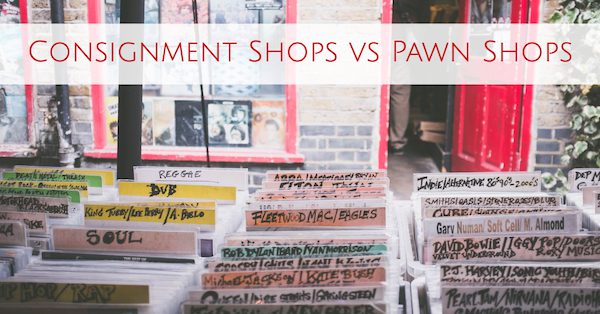What comes to mind when you hear “consignment shop”? What about “pawn shop”? We’ve noticed a lot of folks are not aware of the differences between consignment shops and pawn shops, and since we offer both options at Lambert Pawn, we thought it was worth clarifying.
Consignment Shops vs Pawn Shops
The difference between consignment shops and pawn shops comes down to 3 things:
- When the ownership of the item is relinquished
- When the seller is paid
- How the shop is paid
When the ownership of the item is relinquished by the seller to the shop
If you are looking to earn some cash, with no real urgency in turn for items you no longer want or need, you are looking for a consignment shop. If you have an immediate need for cash for items you know are worth some collateral but don’t necessarily want to sell, you are looking for a pawn shop.
And that is the key difference when it comes to ownership of your item. You only relinquish ownership of your item to a pawn shop if you fail to meet the terms of the agreed upon loan (with the item held as collateral). A consignment shop exists specifically to take your unwanted items and sell them to the public, earning you a share of the sale price. This means ownership or authority of the item technically is relinquished when you leave your items at the consignment shop with an agreed upon understanding of the commission share.
Consignment Shop Consignment Shop has ownership or selling authority over item once the commission shares are agreed upon and item is left with the shop. If item fails to sell, the seller is able to pick-up their unsold items.
Pawn Shop Pawn shop owns the item if the seller fails to repay the short-term loan in accordance with the loan terms.
When does the seller get paid?
Let’s start by defining which party we are referring to when we speak of “sellers” for consignment and pawn shops. If you take items into a consignment or pawn shop to sell or receive a loan on, you are the seller. For the purpose of this article, the seller is not the party that is responsible for the actual sale of an item to the public, which will be referred to as the “shop”.
Now that we have defined who the seller is, let’s talk about when the seller (you) gets paid. If you are bringing an item to a pawn shop, you will receive cash on the spot as an upfront advance on a short-term loan, which you will be expected to pay in full in accordance to the loan terms. If you don’t, you forfeit the ownership of the item to the pawn shop.
Consignment shops have lower risk of losing an item but also have a higher risk of you not receiving any money at all. Fact of the matter is, if the item doesn’t sell, you don’t get paid. The bright side is that if the item doesn’t sell, you don’t lose it to the consignment shop but rather are free to pick it up and try another means of selling it.
Consignment Shop Seller gets paid when the item sells. If item does not sell, seller receives item back.
Pawn Shop Seller gets “paid” upfront with the item held as collateral. Seller received item back once loan terms are met in full.
When is the shop paid?
A consignment shop will get paid when the item sells. Typically the consignment shop will receive a percentage of the item’s sale price, with the seller receiving the other portion. Consignment shops typically have standard store policies on how percentages are charged. The seller should be fully aware of what the selling terms are before they relinquish their items to be sold by the shop.
Pawn shops are paid in two ways. The most common earnings a pawn shop sees is from the interest charged on the pawn loan itself. Most pawn loans are paid back in full. However, if a loan is not paid in full, the pawn shop has a second opportunity for earning money and that is through sale of the item that was held as collateral.
Consignment Shop Shop is paid when the item sells. The shop will keep a percentage of the sale price.
Pawn Shop Shop is paid via interest on the pawn loan and/or through resale of forfeited items.
Hopefully this clears up some of the misconceptions around secondhand stores. Consignment shops and pawn shops are really quite different from a seller’s perspective. Before you delve into an agreement with a secondhand shop, do your homework and make an educated decision on how to earn cash on your gently used items.

